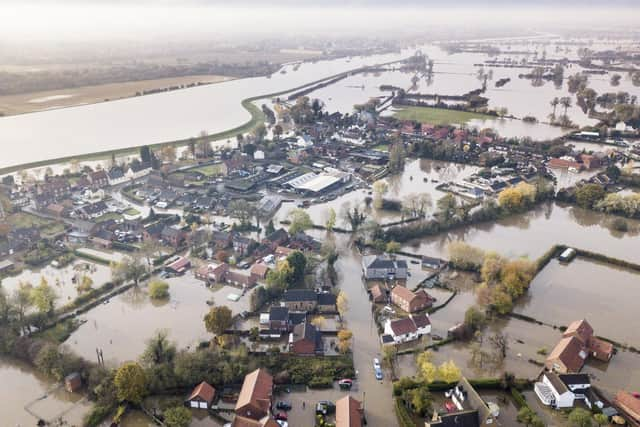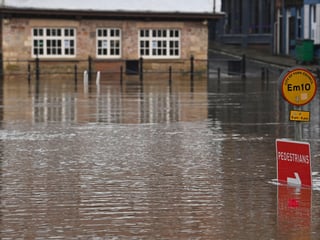Rise in flood victims more likely to suffer from poor mental health, Yorkshire flooding experts warn
The rise in the number of people experiencing poor mental health, whose homes have been damaged by storms and flooding, revealed in wide reaching research - has increased concerns that a lack of long term strategy for the region as a whole will see a "huge" economic and health burden.
A team of researchers from The University of York has now called for the Government to contribute funding to the region’s mental health initiatives and to deliver a commitment to have a long term strategy on flooding for the whole of Yorkshire.


Advertisement
Hide AdAdvertisement
Hide AdDr Joanna Cruz, from the University of York, told The Yorkshire Post: "The impact that flooding has on people is quite severe.
"Flooding is happening in the region every year - so people need to be able to be resilient against this kind of event.
"They (the Government) need to focus on the communities directly, that are more prone to flooding and help with programmes and local networks of organisations to build mental health resilience."
It comes as communities in the region remain vigilant over Storm Christoph with authorities monitoring river levels in Yorkshire and preparing for more rain expected this week.


Advertisement
Hide AdAdvertisement
Hide AdMajor incidents were previously declared in South Yorkshire Greater Manchester, and flooding in York and parts of North Yorkshire including Malton.
Previous research led by The University of York, found that people whose homes have been damaged by storms and flooding are at greater risk of mental illness.
The study looked at the flooding impact on anxiety, depression and post-traumatic stress disorder (PTSD).
Dr Cruz highlighted results that found the prevalence of anxiety in the population exposed to flooding reached 20 per cent, while for the general population it is around six per cent.


Advertisement
Hide AdAdvertisement
Hide AdWhile the prevalence of PTSD in the general population is around eight per cent, but rises to 30 per cent in the population exposed to flooding.
"Numbers are quite frightening in terms of mental illness prevalence," Dr Cruz said.
The study, published at the end of last year, estimated the current economic and social costs of mental ill health were estimated to reach £119bn each year.
While more frequent heavy winter rainfall and changes in land use are contributing to increased surface and river flooding, with one in six properties now at risk in England.


Advertisement
Hide AdAdvertisement
Hide AdThe research team have called for a long term approach to support mental health at a local level rather than reactionary.
"Localities that have experienced or face a high risk of flooding need more investment in psychological support, and this will be needed in the long-term, and not just in the form of a crisis response," said Dr Cruz.
Flooding across the UK could increase by an average of 15-35 per cent by the year 2080, according to recent research.
The north and east of Scotland is facing a 34 per cent increase in the magnitude of flood events while the North of England and Wales are similarly high at 25-28 per cent, a study from the University of Edinburgh has suggested.
Advertisement
Hide AdAdvertisement
Hide AdLondon and the Midlands have the lowest percentage increase. The magnitude of their one in two-year events will increase by 18 per cent.
Given the high percentage for the North and prevalence of flooding across the region each year, Professor Tom Coulthard, from the University of Hull, has called for long-term investment in Yorkshire’s assets.


This includes backing a multi-million-pound National Flood Resilience Centre in the Humber region.
Ark, a project led by the University of Hull and Humberside Fire & Rescue Service, aims to be the first centre of its kind, anywhere in the world.
Advertisement
Hide AdAdvertisement
Hide AdSeveral possible locations have been earmarked in the region for the scheme which aims to provide the emergency services and responders with a controlled environment for simulated training in both urban and rural flood events, and includes a full-scale 120-metre-long street and a water rapids course.
The facility will also be a base for world-leading research and innovation, focused on enhancing business, societal and community resilience to flooding; vitally needed as the world faces up to a climate change induced doubling of flood risk by 2050.
A joint bid has been submitted for Ark by the University of Hull and Humberside Fire & Rescue Service, backed by North Lincolnshire Council.
Professor Coulthard, from the Energy and Environment Institute at the University of Hull, told The Yorkshire Post: "It would really be a jewel in the crown for flood research in the Yorkshire region.
Advertisement
Hide AdAdvertisement
Hide Ad"We've got all the plans for it - oven baked as our Prime Minister would say... It's been with the Government for 18 months or so.
"This past decade we have seen more and more large-scale flooding events - we need to strategically plan for the future.
"Now is the time to act."
Professor Dan Parsons, director of the Energy and Environment Institute, at the University of Hull, added: "Ark will prove to be a game-changer in how we tackle and recover from these events, which are only going to get worse as we suffer the consequences of climate change.
"It is about becoming more resilient to flooding as a society. We need to learn to get wet better and Ark will help us do that.”
Advertisement
Hide AdAdvertisement
Hide AdIn South Yorkshire Professor Martin Mayfield, from the University of Sheffield, said a disproportionate amount of national research and development funding going into the so-called ‘golden triangle' of London, Oxford and Cambridge.
In a challenge to Boris Johnson’s levelling-up agenda, he said that this funding gap will drive education and innovation inequalities, which could aid with regional flooding.
"For all sorts of reasons too much money goes to the south," Professor Mayfield said.
"We don't have the ability to build up regional hubs of excellence. It's not just universities that need that expertise and that support in the region - there is a capacity building need, a knowledge exchange need."
Advertisement
Hide AdAdvertisement
Hide AdWhile acknowledging improvements in flood defenses in the region over the past five years he has called for regional hubs of excellence to be established across Yorkshire and the Humber.
He said: "If we had regional hubs for flooding it would help. It's about taking a systemic approach to this.
"The problem is much bigger and not going away than just a bit of flood protection.
"It's more difficult than it should be for us to develop local capacity in a region... There should be better support for regional knowledge exchange and capacity building between universities, local authorities and effected communities so we can understand the problem."
Advertisement
Hide AdAdvertisement
Hide AdThe Department of Environment, Food and Rural Affairs (Defra), have been contacted by The Yorkshire Post for response.
______________
Support The Yorkshire Post and become a subscriber today.
Your subscription will help us to continue to bring quality news to the people of Yorkshire. In return, you'll see fewer ads on site, get free access to our app and receive exclusive members-only offers. Click here to subscribe.
Comment Guidelines
National World encourages reader discussion on our stories. User feedback, insights and back-and-forth exchanges add a rich layer of context to reporting. Please review our Community Guidelines before commenting.
